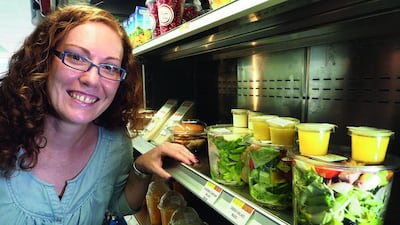For the past decade, I’ve had a love-hate relationship with food, more hate than love, if I’m honest. I used to love food – I ate pasta, bread, pastries and Vegemite to my heart’s content, but 10 years ago I had a messy break-up with all things I found tasty when I was diagnosed with coeliac disease. Coeliac is an autoimmune disease that affects the small intestine, forcing sufferers on to a gluten-free diet for life.
I can still recall the day I got the diagnosis. At first, I felt relief that what I’d been suffering – severe stomach cramps, a constant sickly feeling and other less savoury reactions – wasn’t something more serious. Once the reality of having to restrict my diet to foods without wheat, barley or rye products kicked in, it was sad and frustrating. I felt alone and confused. Although considered hereditary, no one else in my family had it and initially I felt like I had no one who truly understood, apart from my mum who made it her problem too and has been my saviour ever since. I found my way thanks to a couple of colleagues who also had the condition and I’ve slowly come to terms with it. It’s easier when I tell myself that my insides are healthier than everyone else’s because I can’t eat the fast food, and that I’m lowering the chances of being hit by cancer or suffering infertility, which are risk factors for coeliac sufferers.
Thankfully, gluten-free food options are more readily available now. Since arriving in the UAE from Australia last February I’ve been pleasantly surprised by the access to suitable food in the supermarkets, restaurants and cafes. There’s nothing more exciting than being able to walk into a gluten-free cafe or bakery and order anything on the menu. That said, there are some situations I still find difficult. Office cake gatherings top that list – I tend to seek out the comfort of my desk while everyone else eats what I would dearly love to. Parties and buffet dinner functions are hard too, as I’m never quite sure what’s in the food being offered, and so spend half the evening searching for someone who can tell me what I can eat and working out whether what they are saying is true.
One of the frustrations is the sometimes-blasé attitudes of others, and sometimes, even food attendants. Eating a little bit of gluten won’t kill me, but it causes serious harm. If I eat something loaded with gluten, I’m sick for at least two days; something with a little bit of gluten could have me suffering for a few hours to a whole day.
I went into a food outlet in Abu Dhabi recently and was excited when I saw they had gluten-free pasta on the menu. I asked whether the sauce was also gluten-free. The attendant said he couldn’t guarantee it, “but the pasta definitely was”. When pushed on how that made the dishes gluten free, he said “some people don’t care about the sauce”. I had a heated conversation with him and left frustrated and angry that food outlets still don’t understand the importance of serving 100 per cent gluten-free food.
On the flip side, on a recent trip to Vienna, I was amazed to find so many options and so much care being taken by chefs and food outlets, including patisseries, when it came to gluten-free offerings. Pastries, stews, sausages, you name it – I was able to feel “normal” again. Those who know me well know I’m not one to shine a light on myself unnecessarily. While I prefer to be seen and not heard, since I broke up with gluten, I’ve been forced to find my voice and use it to educate others – I hope it’s working.
Melinda Healy is assistant editor of The Weekend section at The National

